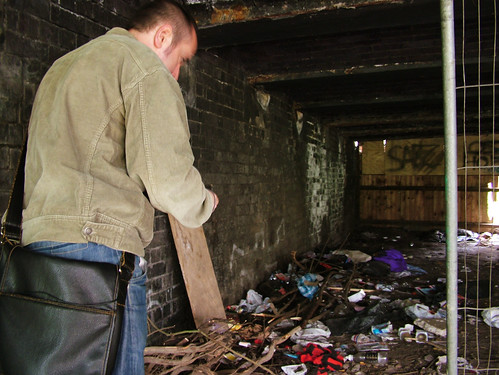
Earlier this week Jon Hickman asked me to say a few things at the Digital Britain unconference in Birmingham. He wanted me to share some opening thoughts about the interim reports 5th objective:
Developing the infrastructure, skills and take-up to enable the widespread online delivery of public services and business interface with Government.
An overview of the entire mornings conversation is here, but I wanted to share my thoughts.
This objective, “to develop the infrastructure skills and take up to enable the widsespread online delivery of public services and business interface with government” appears to almost entirely about refining ane ecnouraging online transactions. It suggests that the ambition is to use the net to govern more efficiently. That is unquestionably important but it ignores how the web can and will shift our democratic relationships, allowing self organising citizens to ignore, short circuit, or improve how we govern or self govern. Core to this is ensuring that we all are able to effectively publish (rather than simply consume) online, should we wish to do so. This democratic shift is also being accelerated by the problems being faced by the big cultural and media organisations which Digital Britain as a report appears to be attempting to save.
Digital Britain says very little that seems relevant to this democratic shift. A couple of things that it mentions which are tangental are:
1 Safety: “We want to make the UK the safest place to do business online”. Who’s going to argue with that? It will make us more likely to use the web to relate to government and take part in civic activity, won’t it?
Well it may not. The safest place to do business online could also be the most controlled and closed down. If that is the route we go then democracy baby and democracy bathwater will be scootling down the drain together. (Byron Report )
The report also appears to cling to a shadow of the unworkable idea of a film classification type service (” clear and effective labelling to help people avoid material likely to be harmful or offensive”) and adds “There should be a clearer role for trusted brands that provide a guarantee of the nature of the content that may be accessed through their product (e.g. the approach Apple has taken to making available applications that run on iPhone).” Apple do this because they have found a funding stream around applications. Which “trusted brands” can make that happen with public content?
2 National Digital Literacy Plan. This is the other directly relevant bit: “We will only reap the benefits of becoming a digital nation if we ensure that everyone has access to the right education, skills and digital media literacy programmes to ensure that being digital is within the grasp of everyone.”
Yes is the simple answer to that. Please though don’t make this a digital media literacy national curriculum which will date before it’s finished. For this to work you have to find a mature balance between digital media literacy, learning and safety.
So I found two things in the report relevant to the issue of the net and democracy. This led me, by way of starting a conversation, to raise these additional points:
1 Should we stop existing IT projects which could stifle digital media literacy. Anything which is overly safe and overly cautious is likely to hamper our progress as a digitally literate nation. For example learning portals for schools etc – are they going to help or hinder? Do they really encourage rich informal learning and the sort of free flowing collaborations skills which will give us an economic advantage? (answers to this below please!)
2 Transparency isn’t mentioned. Transparent appears only once. Transparency will be the core media virtue in the future, replacing others such as impartiality. Transparency is how we hold publishers and politicians to account. What does transparency mean? Could there be principles to describe transparency which can then form the basis for a new set of standards against which online activity can be measured?
3 Talk to the folks next door. Whilst I was ranting on about how the people who wrote Digital britain didn’t seem to have read the Power of Information stuff Dave Harte did a quick search of the document to find no mention of the Power of Information Taskforce. Unh.
My twoppenorth as an opener. An overview of the entire mornings conversation is here with recordings of it all from the marvellous Rhubarb Radio. Aggregations of national conversation on twitter at #dbuc09. Thanks to Nat and Julia at www.aquila-tv.com for organising and BillT for the original idea. Notes form the Manchester Event are here. BTW Recasting the Net looks like another postive contribution to this conversation.
